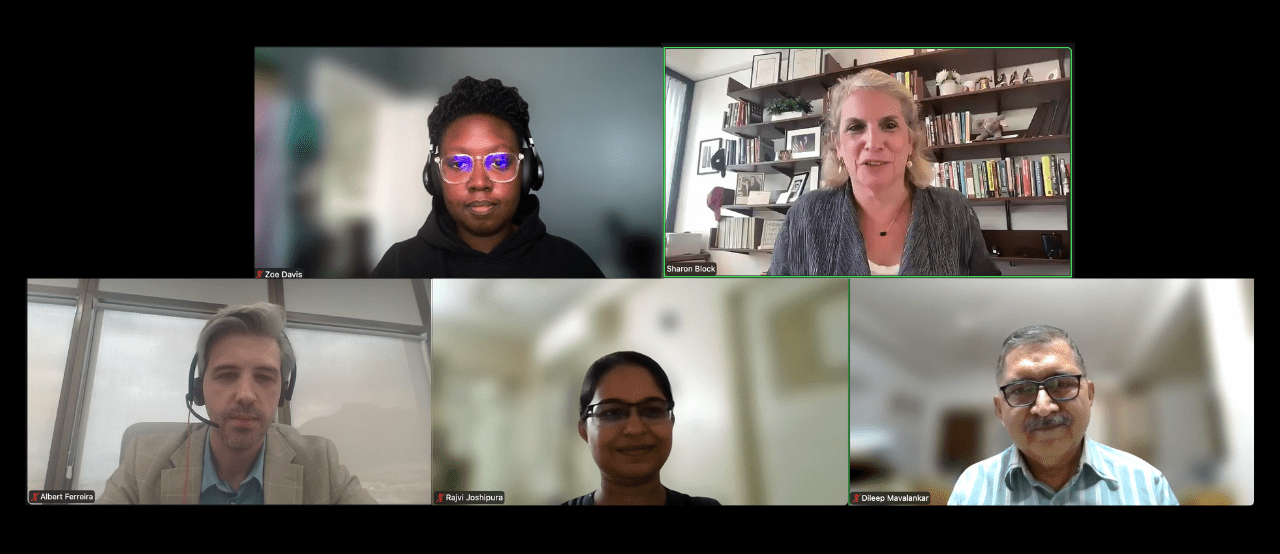Watch the “Protecting Workers in Heat Action Plans” video. For subtitles, be sure to toggle the closed captioning button on.
A multi-country session, titled ‘Protecting Workers in Heat Action Plans’ hosted jointly by the Mittal Institute, Center for Labor and a Just Economy at Harvard Law School, and Africa Office of the Harvard University Center for African Studies brought together experts from India, South Africa, and the United States to address the urgent intersections of labor, climate, and resilience.
Opening the session, Hitesh Hathi, Executive Director of the Mittal Institute, stressed the global scope of the discussion. “We are facing a global crisis of rising temperatures, heat waves, with multiple issues, some of which we are just beginning to get a handle on,” he said. Highlighting a recent initiative, he added, “We convened ‘India 2047: Building a Climate Resilient Future’, which brought together leaders in climate science, health, labor, business, and urban planning. Sharon, who you’ll hear from in a minute, was one of the key speakers there and played a pivotal role in organizing the event.”
The panel was moderated by Sharon Block, Professor of Practice at Harvard Law School and Executive Director of the Center for Labor and a Just Economy. She underlined the importance of seeing climate and labor issues together. “Climate change is not just an environmental issue. It is a labor issue, a health issue, and a justice issue,” she said. Block pressed the panelists to connect policy to lived realities. “When we think about adaptation, who is bearing the cost? Too often, it is the workers on the frontlines who are least able to absorb it,” she noted. She also highlighted the need for structural change: “We cannot expect resilience to come only from individual sacrifice. Systems — laws, policies, and institutions — must take responsibility.”
When we think about adaptation, who is bearing the cost? Too often, it is the workers on the frontlines who are least able to absorb it […] We cannot expect resilience to come only from individual sacrifice. Systems — laws, policies, and institutions — must take responsibility.

Clockwise from the top-left: Zoe Davis, Sharon Block, Dileep Mavalankar, Rajvi Joshipura, and Albert Ferreira.
From Boston, Zoe Davis, Senior Climate Resilience Project Manager, shared the city’s approach. “Our work is rooted in understanding which communities are most vulnerable to extreme heat and how to get resources to them first. Equity has to be built into resilience planning from the start.”
Speaking from Cape Town, Albert Ferreira, Manager of the Resilience and Climate Change Branch, described the pressures facing African cities. “Cape Town has already lived through Day Zero when our water almost ran out. Climate resilience for us is not an abstract discussion — it is about survival and protecting the most vulnerable in our city.”
Representing the voices of informal workers, Rajvi Joshipura, Senior Coordinator of the Self-Employed Women’s Association of India (SEWA), emphasized the daily realities of labor under heat stress. “Women street vendors and home-based workers are out in the heat every day. They don’t have the option to stop working, and when we talk about resilience, their survival strategies must be part of the plan.”
On the public health front, Dileep Mavalankar, Distinguished Professor of Public Health and former Director of the Indian Institute of Public Health Gandhinagar, highlighted lessons from India’s early heat action plans. “Ahmedabad’s heat action plan showed us that preparation saves lives. Simple interventions like public awareness, early warnings, and water stations can prevent deaths during heat waves, but scaling this across cities remains a challenge.”
Speakers agreed that while contexts differ, the themes are shared across borders. Ferreira noted, “What happens in Cape Town is not disconnected from what happens in Boston or Ahmedabad. We are all on the frontline of a global crisis.”
Davis added, “Every city is experimenting, but none of us have all the answers. By sharing experiences across continents, we can build a collective roadmap.”
Block drew the threads together in closing, emphasizing solidarity and collective problem-solving. “What we’ve heard today is that no one has the luxury of tackling climate change alone. The connections between labor, health, and climate are global, and our solutions must be as well.”
Written by Yuvika, Climate Coordinator at the Mittal Institute India office.
☆ The views represented herein are those of the interview subjects and do not necessarily reflect the views of the Mittal Institute, its staff, or its steering committee.
